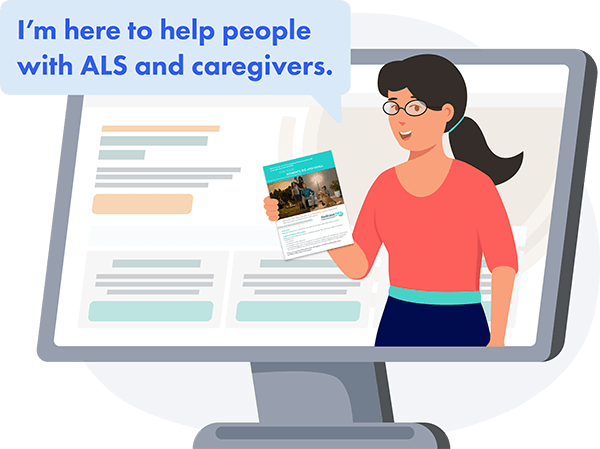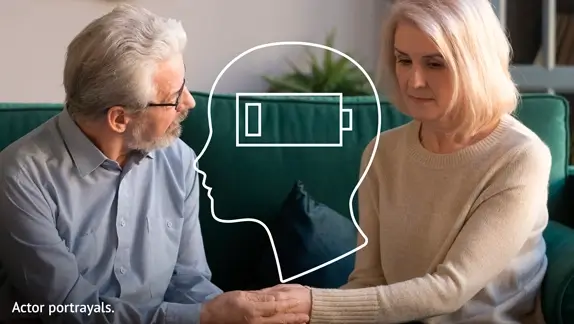A diagnosis of amyotrophic lateral sclerosis (ALS) can be life-altering for your entire family. And deciding to care for someone with ALS takes compassion, selflessness, and unwavering devotion.
TO LEARN MORE ABOUT RADICAVA®, SPEAK WITH A JOURNEYMATE RESOURCE SPECIALIST 1-855-457-6968. SEE MORE
TO LEARN MORE ABOUT RADICAVA®, SPEAK WITH A JOURNEYMATE RESOURCE SPECIALIST 1-855-457-6968. SEE MORE
Caring For a Loved One With ALS
Caring for someone with ALS takes compassion and an unwavering devotion.
It can be a rewarding experience, a source of personal satisfaction, and may help bring you closer together.
Providing care can also be filled with challenges, especially if you are the day-to-day caregiver. It can take a physical, psychological, and emotional toll. While your focus may seem to always be on your loved one, it's important that it does not cause you to neglect your own needs.

Reminders and helpful tips
Take care of yourself
Continuing to do the things that are important and enjoyable to you is not selfish. Doing so may help improve your ability to care for your loved one.Ask for help
Reach out to family and friends when you need a hand. Be open to accepting help when it's offered.Value yourself
Feelings of guilt and anger are normal. But don't let them keep you from recognizing the amazing job you're doing.Manage your stress
Set expectations with your loved one, family members, and friends. Communicate your feelings and needs. Take part in activities that reduce stress, such as exercise and family/social events. Professional counseling can also be beneficial.Be aware of your emotional health
Providing care can affect your mental and emotional health. Talk to your doctor if you think you're having difficulty with your emotions or behavior, or have any other personal health concerns.Talk to other caregivers
Share your experiences with people who are in similar situations. They can offer advice, share solutions to common problems, and lend an understanding ear.
Watch a caregiver of a loved one with ALS share experiences with ALS and RADICAVA ORS®.
Gia Shares a Caregiver’s PerspectiveProviding support during their ALS treatment
RADICAVA ORS® (edaravone) and RADICAVA® (edaravone) IV are FDA-approved treatment options for ALS. At times, the infusion schedule for RADICAVA® IV may seem challenging. Also, because RADICAVA ORS® and RADICAVA® IV do not reverse ALS, your loved one may feel it is not making a difference.
If your loved one starts treatment with RADICAVA ORS® or RADICAVA® IV, they may need encouragement at various times. It may help to remind them that in clinical trials, RADICAVA® was shown to slow decline in the loss of physical function in people with ALS.
Facing challenges is a regular part of caregiving. It helps if you keep a positive attitude as best you can. You may also find this works both ways. Some days, you may have to motivate your loved one in their fight against ALS. Other times, you may find them encouraging you.
Do you need more information about RADICAVA ORS® and RADICAVA® IV?
You're never alone
Caring for a loved one who has ALS takes a collaborative approach. Remember to connect with family and friends for support. National and local support organizations can be a great resource for additional education and advice. And be sure to talk to your loved one's doctor about any questions or concerns.
Have questions about RADICAVA® and ALS?
A JourneyMate Resource Specialist is ready to help you find information and educational resources about ALS and RADICAVA ORS® and RADICAVA® IV as you move forward on your journey with ALS.
Call toll-free 1-855-457-6968 between 9 AM and 9 PM ET, Monday through Friday.

Coping With Burnout
Being a caregiver for someone living with ALS can be fulfilling. It can also consume a great deal of your physical, mental, and emotional energy. Burnout can make it difficult to be the caregiver you want to be, and it may also cause resentment or even take a toll on your health.

Look out for these signs of burnout:
Social withdrawal
Inability to sleep
Exhaustion
Irritability
Inability to relax or concentrate
Forgetfulness
Depression and anxiety
Lack of appetite
Considering respite care
Respite care is simply a moment or period of rest or relief and is meant to give you a break from daily care responsibilities. It's important to talk with your loved one about taking time for yourself before you need it.
There are different ways to give you the chance to have respite care. These include in-home substitute care from a trained professional, a short-term stay for your loved one at a facility or residence that has trained healthcare staff onsite, or simply having family and friends help out.

Spending your “time off”:
Go to the movies
Go on a short vacation
Take a nap, read, or watch TV
Attend a support group
Take a walk
Go out with friends
Get a massage, facial, or manicure
Exercise or play a game or sport
Caring for a loved one who has ALS takes a collaborative approach. Remember to connect with family and friends for support. National and local support organizations can be a great resource for additional education and advice. And be sure talk to to your loved one's doctor about any questions or concerns.
Caring for yourself can help you provide the best care possible for your loved one.
The information and advice provided here are general in nature and are not intended to be a substitute for professional medical advice, diagnosis, or treatment. You are strongly encouraged to seek the advice of your doctor or other qualified healthcare provider with any questions regarding a medical condition.
